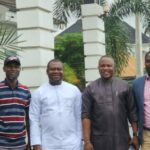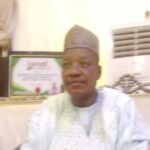Global Initiative for Food Security and Ecosystem Preservation (GIFSEP), said it is engaging government and community leaders across the 13 local government areas in Nasarawa state on how to adapt to climate change issues.
The Project Officer of African Activists for Climate Change Justice (AACJ), one of the partners of GIFSEP in the state, Joseph Ibrahim disclosed this in an interview with journalists on Wednesday in Lafia, at the sideline of the one-day training of Civil Society Organizations (CSOs), to enable them advocate for climate Justice in Nasarawa state.
Other partners are OXFAM with support from the Ministry of Foreign Affairs (MoFA) of the Netherlands and the Pan African Climate Justice Alliance (PACJA).
He said the team of the dialogue which is ‘Strengthening the civil space in Nasarawa state’ was organised under the aegis of Nasarawa State Network on Environment and Climate Justice (NASNECJ), and is aimed to enable them to advocate for climate justice in Nasarawa State.
According to him, the training was targeted at strengthening the civic space in the state as well as building their capacities to enable them to engage more with government and other relevant stakeholders around climate change and climate justice for the wellbeing of residents of the state.
Ibrahim explained that the organisation had earlier established the NASNECJ to work as an advocacy group to engage stakeholders on the need to design policies that would ensure climate justice in the state.
The AACJ project manager said the NGO was already in the process of documenting and scaling up some indigenous knowledge that was gathered from the communities on how they have been adapting to climate change effects.
According to him, the training was aimed at strengthening the civic space in the state as well as building their capacities to enable them to engage more with government and other relevant stakeholders around climate change and climate justice for the wellbeing of residents of the state.
Ibrahim explained that the organisation had earlier established the NASNECJ to work as an advocacy group to engage stakeholders on the need to design policies that would ensure climate justice in the state.
“We are hoping that the group would be coordinated with a leadership structure that can be more responsive and responsible for engaging with relevant stakeholders in the state.
“We have established the NASNECJ but the network has not really been functioning properly so there is a need to strengthen their capacities and also identify areas of gaps and where we need to strengthen the network to be able to engage government more effectively.
“GIFSEP is engaging government and community leaders across the 13 local government areas in the state on how to adapt to climate change issues.
“We are already in the process of documenting and scaling up some of that indigenous knowledge that we have gotten from the communities on how they have been adapting to climate change effects
GIFSEP is implementing a 5-year project in the State known as the African Activists for Climate Change Justice (AACJ ) in partnership with OXFAM with support from the Ministry of Foreign Affairs (MoFA) of the Netherlands and the Pan African Climate Justice Alliance (PACJA); he said.
Also speaking, lead facilitator at the training and Programme Manager, Eunice Spring of Life Foundation, Benue state, Tine Agenor said the training was aimed at creating a platform for transformational change in the context of climate justice to facilitate collaborative engagement and information sharing in the state.
“This training will help participants to track and report the outcomes of climate actions and community engagement. It would also hold stakeholders accountable for their commitments to sustainability as well as empower citizens to drive climate actions in their communities,” he said.
On his part, one of the participants at the training who is a lecturer in the Department of Geology, Federal University of Lafia, Dr Degree Umar said the training was timely as it would create space for CSOs to engage relevant stakeholders toward addressing climate change impacts in the state.
He pledged to utilize the knowledge gathered so far to contribute his quote in order to attain climate justice.
About 40 participants attended the training and a leadership structure for routine membership engagement was established and inaugurated at the end of the meeting.
READ ALSO FROM NIGERIAN TRIBUNE
WATCH TOP VIDEOS FROM NIGERIAN TRIBUNE TV
- Let’s Talk About SELF-AWARENESS
- Is Your Confidence Mistaken for Pride? Let’s talk about it
- Is Etiquette About Perfection…Or Just Not Being Rude?
- Top Psychologist Reveal 3 Signs You’re Struggling With Imposter Syndrome
- Do You Pick Up Work-Related Calls at Midnight or Never? Let’s Talk About Boundaries







